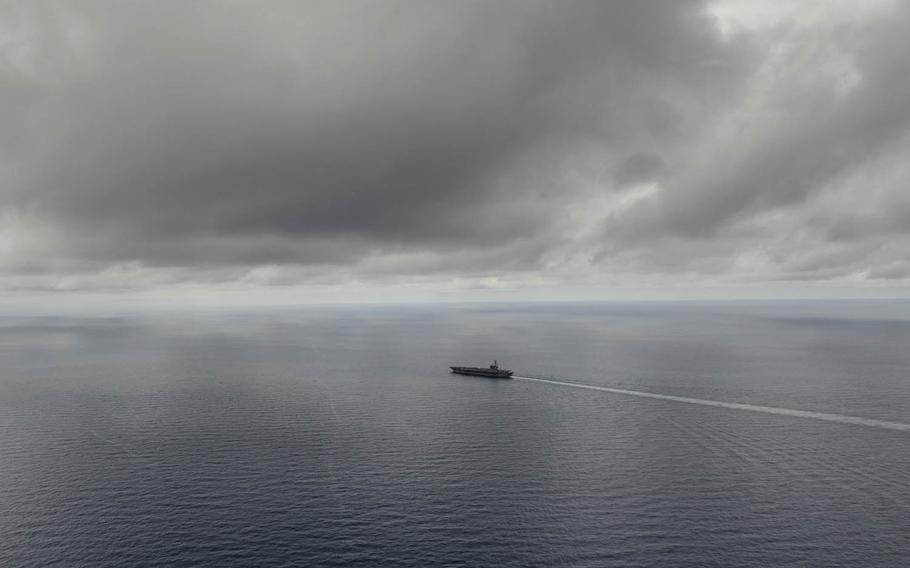
The Navy's only forward-deployed aircraft carrier USS Ronald Reagan transits the South China Sea, Tuesday, July 5, 2016. Ronald Reagan is on patrol in the U.S. 7th Fleet area of responsibility supporting security and stability in the Indo-Asia-Pacific region. (Nathan Burke/U.S. Navy)
YOKOSUKA NAVAL BASE, Japan — The United States and China have a lot of warships in the western Pacific Ocean right now, but the only war being fought ahead of a landmark international court decision is for public opinion.
The consensus among security experts outside of China is that the Chinese will likely lose at least some of the 15 claims brought against them by the Philippines when the Permanent Court of Arbitration in The Hague rules Tuesday on a case years in the making.
However, the Philippines has receded into the background amid displays of sea strength by the Chinese and U.S. navies, coupled with English-language messages from Chinese officials and Beijing-controlled media aimed at the U.S.
New Philippine President Rodrigo Duterte has suggested talks with China after the ruling, cooling rhetoric focused on Manila — while increasing the focus on Washington.
“I think hostile forces in the U.S. worked together to make this case,” said Yongnian Zheng, director of the East Asian Institute at the National University of Singapore, in an English-language YouTube series posted by The People’s Daily, the Chinese Communist Party’s official newspaper.
The heart of the case lays in China’s claims to most of the South China Sea, based on what it deems as historical right. Those claims are set against the U.N. Convention on the Law of the Sea, which China has signed and the U.S. abides by, but hasn’t ratified.
“The tribunal is likely to rule that Beijing’s claim to ill-defined ‘historic rights’ throughout the South China Sea is illegal,” Greg Poling, director of the Asia Maritime Transparency Initiative, wrote for The Cipher Brief on Thursday.
China’s claims to most of the water and its rocks, reefs and small islands conflict with claims from the Philippines, Vietnam, Taiwan, Malaysia, Indonesia and Brunei.
Low-level clashes between China and its neighbors, which include jet fighter sorties over disputed islands in the East China Sea with Japan, have many in the region concerned about escalating conflict.
China’s sea claims also create conflict with the U.S., which maintains freedom of navigation for its ships and aircraft under international norms. About $5 trillion in shipborne trade flows through the sea annually, including $1.2 trillion in U.S. trade.
China has renounced the Permanent Court of Arbitration’s authority to rule on the case since the Philippines brought it to the court. The U.S. and the court have countered that any decision is binding under international law.
“Just deliver the ruling, it’s no big deal — just a piece of trash,” said Dai Bingguo, a former China state councilor, said Tuesday, according to the South China Morning Post.
Dai’s remarks came during a discussion in Washington sponsored by the Carnegie Endowment and China’s Chongyang Institute.
“We Chinese would not be intimidated by the U.S. actions, not even if the U.S. sent all the 10 aircraft carriers to the South China Sea,” Dai added.
Dai was referring to rare dual aircraft carrier operations by the USS Ronald Reagan and the USS John C. Stennis in the Western Pacific in June.
China responded in kind this week. It set up a “no-sail zone” for its own sea exercises, which will last through Monday.
Countries typically post advisories for aircraft and ships to avoid exercises for safety reasons, but no provision within the Law of the Sea allows countries to forbid transit outright during an exercise.
Pacific Fleet officials said this week that Navy ships remain active in the region on routine patrols.
Regardless of the outcome of the ruling, there is no mechanism in place to enforce it. However, a rebuke of China could come with a diplomatic cost in the region.
“In this case, it directly undercuts Beijing’s narrative that it is a peaceful rising power that deserves a larger hand in shepherding the international system,” Poling wrote.
Twitter:@eslavin_stripes